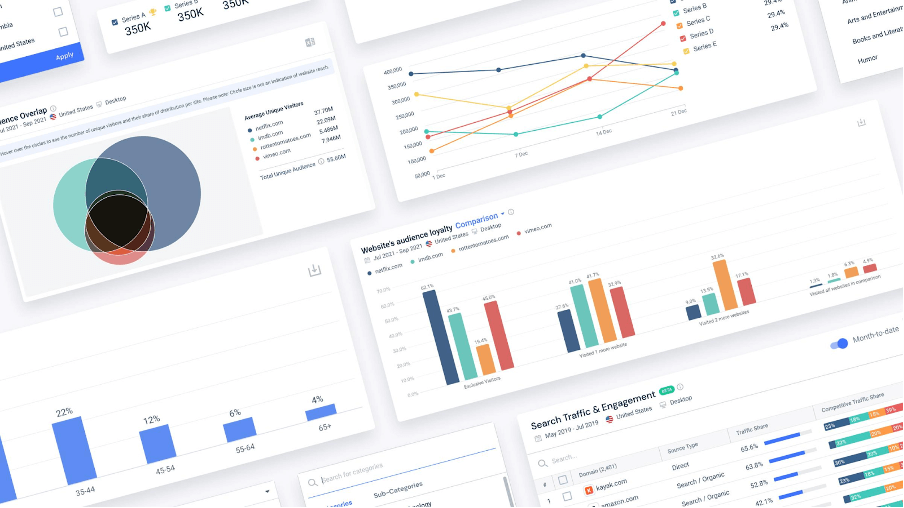In today’s fast-paced business landscape, having access to reliable marketing research tools is crucial for organizations to make informed decisions and stay ahead of the competition. With the rise of digital marketing and the abundance of data available, businesses need effective tools that can help them gather, analyze, and interpret data to uncover valuable insights. In this article, we will explore the world of marketing research tools, their importance, and how they can be leveraged to drive success. So, let’s dive in!
The Significance of Marketing Research Tools

Marketing research tools play a pivotal role in helping businesses understand their target audience, competitors, and market trends. By leveraging these tools, organizations can make data-driven decisions and develop effective marketing strategies that resonate with their customers. The insights gained from these tools enable businesses to identify opportunities, optimize campaigns, and achieve better results.
Surveys and Questionnaires: Capturing Customer Insights
Surveys and questionnaires are essential marketing research tools that allow businesses to collect direct feedback from their target audience. By designing well-crafted surveys, organizations can gather valuable insights about customer preferences, satisfaction levels, and purchasing behaviors. Analyzing survey data helps businesses understand their customers’ needs and tailor their products or services accordingly.
Social Media Listening Tools: Monitoring Online Conversations
In the digital age, social media platforms have become a treasure trove of consumer opinions and sentiments. Social media listening tools enable businesses to monitor online conversations, track brand mentions, and analyze customer feedback in real time. By understanding what customers are saying about their brand and competitors, organizations can identify trends, address issues promptly, and engage with their audience effectively.
Web Analytics: Tracking User Behavior
Web analytics tools provide valuable insights into website traffic, user behavior, and conversion rates. By analyzing data such as page views, bounce rates, and click-through rates, businesses can optimize their website’s performance, identify areas for improvement, and enhance the user experience. Web analytics tools also help measure the effectiveness of marketing campaigns, allowing organizations to allocate resources efficiently.
Competitive Analysis Tools: Gaining a Competitive Edge
Staying ahead of the competition requires a deep understanding of their strategies, strengths, and weaknesses. Competitive analysis tools enable businesses to monitor their competitors’ online activities, track keyword rankings, and uncover valuable insights about their target market. By analyzing competitor data, organizations can identify untapped opportunities, refine their marketing strategies, and differentiate themselves in the market.
Keyword Marketing Research Tools: Optimizing Content for Search Engines
In the digital realm, search engine visibility is crucial for attracting organic traffic. Keyword research tools help businesses identify relevant keywords and phrases that resonate with their target audience. By optimizing website content and marketing campaigns with the right keywords, organizations can improve their search engine rankings and drive qualified traffic to their website.
Data Visualization Marketing Research Tools: Presenting Insights Effectively
Data visualization tools transform complex data into easy-to-understand visuals such as charts, graphs, and infographics. These tools enable businesses to present insights and trends in a visually appealing manner, making it easier for stakeholders to grasp complex information. Effective data visualization enhances decision-making processes, facilitates data-driven discussions, and improves communication across teams.
Customer Relationship Management (CRM) Software: Managing Customer Data
CRM software is a vital tool for managing customer data and improving customer relationships. It allows businesses to store customer information, track interactions, and gain a holistic view of each customer’s journey. By leveraging CRM data, organizations can personalize their marketing efforts, nurture customer loyalty, and deliver exceptional customer experiences.
A/B Testing Marketing Research Tools: Optimizing Marketing Strategies
A/B testing tools enable businesses to experiment with different versions of their marketing campaigns and determine which variant performs better. By testing variables such as headlines, images, or call-to-action buttons, organizations can identify the most effective strategies for driving conversions and engagement. A/B testing helps refine marketing campaigns, optimize user experiences, and maximize ROI.
Heatmap Tools: Understanding User Interactions
Heatmap tools provide valuable insights into how users interact with a website or landing page. By visualizing user behavior such as clicks, scrolling patterns, and mouse movements, businesses can identify areas of interest and areas that receive less attention. Heatmap analysis helps optimize website design, improve user engagement, and enhance conversion rates.
Sentiment Analysis Tools: Gauging Customer Sentiments
Understanding customer sentiments is essential for shaping marketing strategies and brand perception. Sentiment analysis tools analyze customer feedback, reviews, and social media posts to determine the overall sentiment toward a brand or product. By gauging customer sentiments, organizations can identify areas for improvement, address negative feedback, and enhance their brand reputation.
SEO Tools: Boosting Search Engine Visibility
SEO tools are instrumental in optimizing website content and improving search engine rankings. These tools provide insights into keyword performance, backlink profiles, and technical SEO aspects. By leveraging SEO tools, businesses can identify opportunities to enhance their website’s visibility, attract organic traffic, and outrank competitors in search engine results.
Marketing Automation Software: Streamlining Marketing Campaigns
Marketing automation software simplifies and streamlines repetitive marketing tasks, allowing businesses to focus on strategy and creativity. These tools automate email marketing, lead nurturing, and campaign management, resulting in improved efficiency and scalability. Marketing automation helps organizations deliver personalized experiences, nurture leads effectively, and drive revenue growth.
Data Mining Marketing Research Tools: Extracting Insights from Big Data
With the increasing volume and complexity of data, businesses require robust data mining tools to extract valuable insights. Data mining tools analyze large datasets, identify patterns, and uncover hidden correlations. By leveraging data mining techniques, organizations can make data-driven decisions, identify market trends, and gain a competitive edge in their industry.
Case Study: How a Small E-commerce Company Leveraged Marketing Research Tools to Boost Sales and Customer Engagement
In this age, the market is changing all the time, which needs the brands to stay updated with every change to take actions based on them. Market research is becoming an essential part of any business. To be able to understand the different market aspects and any updates that are happening. In this case study you will know how an E-commerce company leveraged market research to enhance its customer’s engagement and increase sales.
The Challenge
- The company was struggling to reach the target audience and engage with them. Also to be able to monitor their different marketing campaigns and know their results.
- The company needed more insights into the customer’s preferences in the market. And understand the competitor’s strategies, and know the campaign’s preferences.
The Solution: Implementing Marketing Research Tools
The company decided to depend on market research tools, one of these tools was AIM Research. Which provided real-time insights and data about the market, and helped the company to reach the needed information.
-
Surveys and Questionnaires: Capturing Customer Insights
- The company started by launching surveys targeted to their customers. To understand their customer’s preferences, pain points, and satisfaction levels about the services the company provides.
- They gained valuable insights about their services from the customers. Which led to improving their products and service offerings, and creating better marketing messages that match their customer’s interests.
-
Social Media Listening Tools: Monitoring Online Conversations
- The company depended on AIM Insights as a social listening tool, to track its performance across the different platforms. Helping the brand to track all the related conversations, all the brand mentions, and the market trends.
- It led to findings about customers’ interests in sustainable products. Helping the brand to align with the customer’s interests and beliefs.
-
Web Analytics: Tracking User Behavior
- They analyze the website’s different metrics including website traffic, bounce rates, and conversion rates.
- They redesigned their home page, based on the insights they got. Which led to an increase in customer engagement, and higher conversion rates.
-
Competitive Analysis Tools: Gaining a Competitive Edge
- They used competitor analysis tools, to be able to track the competitor’s different strategies. And understand the competitors’ ranking across the different platforms.
- They identify the gaps in the market between competitors, to be able to improve their services. Which led to improved customer experience and gain a competitive advantage.
-
SEO Tools: Boosting Search Engine Visibility
- They conducted keyword research, to understand their content ranking. And worked on improving it, leading to a higher search engine ranking for the website.
- The organic traffic has increased on the websites. By targeting higher-ranking keywords in the content that are related to sustainable products.
-
A/B Testing Marketing Research Tools: Optimizing Marketing Strategies
- The company worked on testing different marketing campaigns. Including email campaigns, and landing pages.
- The open rates have improved, as well as the conversion rates, by using more effective campaign elements.
Conclusion
In conclusion, marketing research tools have become indispensable assets for businesses looking to make data-driven decisions and achieve success in the competitive market landscape. By leveraging these tools, organizations can gain valuable insights into their target audience, competitors, and market trends. From surveys and social media listening tools to web analytics and SEO tools, each tool plays a vital role in optimizing marketing strategies and driving results.
To experience the power of advanced marketing research tools firsthand and unlock the potential of your business, we invite you to request a demo from AIM Technologies. Discover how Aim Technologies can empower your organization with cutting-edge solutions tailored to your specific needs. Don’t miss out on this opportunity to take your marketing efforts to new heights.
FAQs
1. Are marketing research tools suitable for businesses of all sizes?
- Yes, marketing research tools can benefit businesses of all sizes. Whether you’re a small startup or a large enterprise, these tools provide valuable insights and help optimize marketing strategies.
2. Can marketing research tools replace traditional market research methods?
- Marketing research tools complement traditional market research methods and enhance their effectiveness. While traditional methods like focus groups and interviews offer qualitative insights, tools provide quantitative data and real-time feedback.
3. Are marketing research tools only useful for digital marketing campaigns?
- While marketing research tools have a significant impact on digital marketing campaigns, their applications extend beyond the digital realm. These tools provide insights that can improve overall marketing strategies and decision-making processes.
4. How often should businesses use marketing research tools?
- The frequency of using marketing research tools depends on the business’s needs, industry dynamics, and campaign cycles. Regular usage, such as monitoring social media conversations or analyzing web analytics, is recommended for timely insights.
5. Do marketing research tools require specialized skills to operate?
- While some tools may require a learning curve, many marketing research tools are designed with user-friendly interfaces. Basic knowledge of data analysis and marketing concepts is beneficial but not always essential for utilizing these tools effectively.




